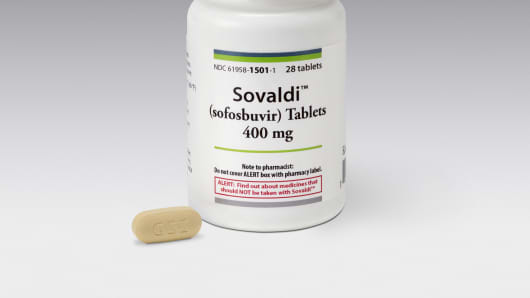A new report out today about specialty drug spending is sure to set off the usual round of alarmist reactions from the usual suspect activists and politicians. But everyone should calm down because the free market is already working to ease the burden.
Here's the deal: total prescription drug spending rose 13% in 2014, and that was the biggest increase since 2003 according to Express Scripts. Of course, that spike is almost entirely due to the high cost of drugs to treat Hep C. In case you missed it, Hep C is a potentially fatal affliction that has exploded in America because it's especially common among the large Baby Boomer segment of the population. The built-in demand for Hep C treatment is kind of like the line outside the Apple Store when there's a new iPhone for sale. One of those treatments, Gilead Sciences' Sovaldi, famously costs as much as $1,000 per day for the 12-week course of treatment. That means the total cost is $84,000.
Read MoreSpecialty drug spending sees record increase
Before you choke on your lunch, remember that the pricey Sovaldi drug treatment is still better and cheaper than surgery and a preferable alternative to, you know... dying. Still, there's just no getting past that $84,000 number. But before you get out your picket signs or call your Congressman, just sit back and let the free market fix this problem before the government screws up another aspect of American health care.
Because a funny thing happens when the market sees that demand is still sky high for a drug despite a super high price: it brings price-reducing competition. And that's exactly what happened when AbbVie brought its competing Hep C drug onto the market. Gilead responded by announcing discounts of up to 46% for Sovaldi and another Hep C drug called Harvoni. If this free market competition is allowed to remain free, prices will continue to go down and the number of treatment options will go up.
Now imagine the likely scenario if blowhard politicians and government agencies had stepped in. There would have been a push to cap and freeze prices while also providing taxpayer-supported subsidies for every Sovaldi user under a certain economic level. To avoid the shortages that would result from the price freeze, HHS would have likely made an exclusive distribution deal with Gilead in a pact that would have all the worst aspects of crony capitalism and socialism combined. But there still would be shortages from time to time as political winds shift and funding goes up and down. This is the same scenario that causes real life vaccine shortages in the U.S. from time to time.
Read MoreFighting mosquitoes with more mosquitoes
I could go on, but you get the point. The government can't make a treatment less expensive or more plentiful for everyone. It can only make it more plentiful and less expensive for some, while risking supply and further treatment innovation for everyone.
The growing number of Americans suffering with Hep C, and those who will be in the coming years, should thank their lucky stars that the free market is so far moving too fast in the treatment race for the government to get in the way.
CORRECTION: An earlier version misspelled Sovaldi.



